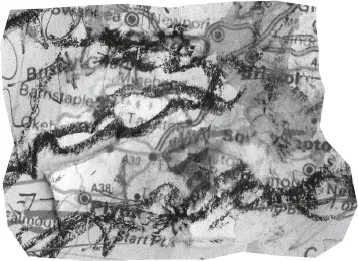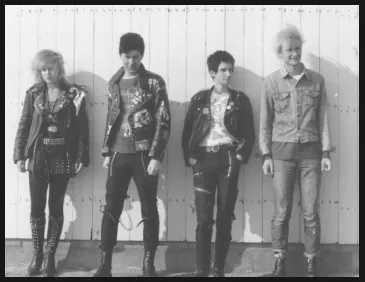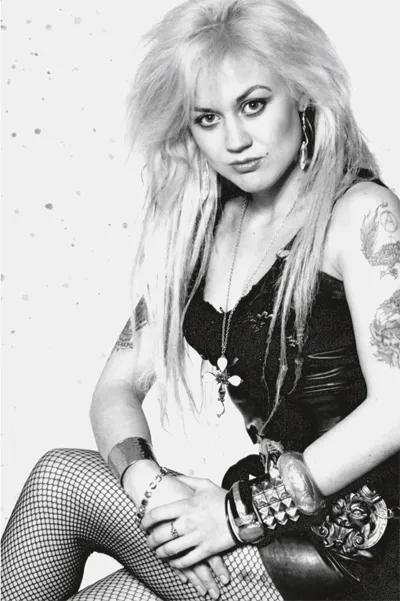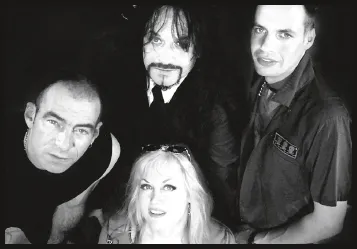![]()
CHAPTER ONE
THE SOUTHWEST
VICE SQUAD
Outside of London, Bristol probably boasted the greatest number of signed punk bands in any one city – due no doubt in part to the presence of the prolific Riot City label as well as some particularly miserable areas of social squalor – and leading the charge was Vice Squad. A breakneck punk band who took the nail of disenfranchised West Country youth and hit it smack on its bored vacuous head, Vice Squad first appeared on the scene with a track, ‘Nothing’, for a regional compilation album, ‘Avon Calling’ (Heartbeat Records, 1979). They actually formed the year before, with Beki Bondage on vocals, Dave Bateman on guitar, Mark Hambly on bass, and Shane Baldwin drumming, and played their first gig at the Bristol University Anson Rooms on April 12th 1979, supporting The X-Certs and Crisis. Shane has fond memories of those bad old days.
“The album got good reviews; a photo of us playing at the Summit Youth Club in Kingswood even appeared in Sounds (an influential music paper of the period), and John Peel played our track a lot on his show. So we were more than pleased! By this time, Dave and I had been trying for a couple of years, with no success at all, to get a band going (they were previously in the TV Brakes with Ian Minter and Tim Clench), so it was definitely a big thrill when we got our copies of ‘Avon Calling’. However, I couldn’t help noticing that as well as sounding quite puny compared to the other more accomplished bands on the record, it even looked puny if you held it up to the light… it took up far less grooves than the other tracks.
“Sounds called our contribution ‘rabid minimalism’, which I had to look up in a dictionary, but that about sums it up. Actually, now it’s one of my favourite Vice Squad tracks…”
After that, things started to move pretty quickly for the band. John Peel picked up on them most enthusiastically, and was no doubt very instrumental in helping their growing profile.
The original Vice Squad L-R: Beki Bondage, Dave Bateman, Shane Baldwin, Mark Hambly
Beki Bondage ‘… punk’s first real pin-up…’
“I thought it was a bit strange that Peel was so keen on our track,” ponders a bemused Shane, “because there were much more established and capable bands on the record, like Glaxo Babies, Joe Public and The X-Certs. I spoke to John for the first time a few years ago, pointing out that we were much more ‘basic’ than the other bands, and he said, ‘Well, basic is what I like’. I chose to take that as a compliment!
“And yes, he was always a staunch supporter; always played our records and we did two sessions for his show, which was a great honour. My dad was a big Peel fan and listened to the show every night, so that gave me a big kick.
“Things started to move quickly after ‘Avon Calling’, that’s true, but they also ground to a halt pretty quickly as well. We supported The Damned and The Ruts at the Locarno, and picked up a bit of a following, but within months, after a lot of crowd trouble, we were banned from most local venues.”
That didn’t stop the band from helping launch Riot City Records with Heartbeat’s Simon Edwards at the helm and going on to create a veritable punk classic as their debut 7”. Even today, despite its thin production, ‘Last Rockers’ still sends a wicked thrill down the spine. The tantalising guitar intro that ushers in the ensuing chaos, Beki’s scathing vocal delivery, and those sombre backing vocals… possibly more luck than judgement, but the band had hit upon a winning formula.
Surprisingly though, that initial deal was some time coming, even after the critical praise heaped upon ‘Nothing’.
“After ‘Avon Calling’ we thought that Simon would immediately give us a singles deal at the very least,” recalls Shane. “But for a long time he wasn’t that keen. After the early bright start things nose-dived quite dramatically, and we only played six gigs in the whole of 1980. After much nagging though, he came to see us at the last of those, a ‘Rock Against Thatcher’ benefit at Trinity Church, after which he cautiously offered to put out a single, where he would pay for the manufacturing and we had to cough up for the studio costs. It wasn’t exactly the record deal of our dreams, but totally understandable seeing as he’d recently lost his Heartbeat licensing deal with Cherry Red.
“The only person we knew with money was our friend Bill White, who owned a cafe, and he loaned us the cash, interest-free, on the sole condition that he was given a credit on all future releases. It was a generous offer, and of course we stuck to it and paid him back as soon as we were able.”
It was a good call for Simon Edwards, because ‘Last Rockers’ sold well over twenty thousand copies and spent almost forty weeks in the then-important Independent Charts, reaching the giddy heights of No. 7, almost unheard of for a debut punk single. The follow-up, four months later in May ’81, ‘Resurrection’, was equally successful, actually reaching No. 4, and the band did a tour with the UK Subs as well as their first session for John Peel. It was almost inevitable a major label would soon snap them up, and sure enough, before the year was out, the band’s debut album was in the racks, with the EMI logo adorning its back cover – much to the horror of some DIY punk purists.
“We expected some flak when we chose to sign with EMI, but to be honest, we never expected it to be quite as bad as it was,” sighs Shane. “In some ways it still mystifies me. When we’re talked about now, it’s always one of the first things mentioned, whereas it never seems to crop up with anything written about The (Cockney) Rejects or The (Angelic) Upstarts, who were already on the label when we joined. I don’t regret it though; it was an opportunity to move into a completely different sphere, a whole new experience.
“Even Simon Edwards, who was understandably hopping mad when we left Riot City, has since admitted that we just had to seize that chance while it was going. The simple fact is that, for most of the bands who were up in arms about us signing to a major label, the argument was purely academic – nobody ever offered them a similar deal.”
Although Shane is philosophical about the label the band chose for themselves, he remains less than flattering about that first album.
“It’s just awful and I’m thoroughly ashamed of it! When Mark Brennan at Captain Oi! reissued the album recently he asked me what I thought we should do with it, meaning what bonus tracks to use etc. I suggested we take the fucking thing into the middle of a field and bury it, but he didn’t find that idea very helpful…”
Harsh words indeed, but enough fans of the band rushed out and bought ‘No Cause For Concern’ for it to narrowly miss entering the Top Thirty of the National album charts. The poorly recorded but best-selling ‘Out Of Reach’ EP followed, but it wasn’t until the summer of ’82 and the far more confident-sounding second album, ‘Stand Strong, Stand Proud’, that the band had a record they were truly proud of.
“It’s a little known fact that EMI wanted us to do ‘Stand Strong…’ at Abbey Road Studios,” reveals Beki. “But the band – mainly Dave – talked me out of doing it! They said they’d use session musicians etc. I can’t believe how naïve I was in those days; they even showed us round the studio where The Beatles recorded and bought us lunch there… but I let myself believe it wouldn’t be a good idea!”
The preceding EP of the same name was even granted the accolade Single of the Week in Sounds, and the band celebrated with several dates in Holland and tours of the USA and Canada. A time fondly remembered by Shane Baldwin.
“The tour of America and Canada in 1982 was definitely the highlight of what we sometimes refer to, laughingly, as our ‘career’. We started in California, and over six weeks drove from coast to coast, ending up, obviously, in New York. We got to play with the likes of Social Distortion, Youth Brigade, Battalion Of Saints, Black Flag and Bad Brains, and also linked up with fellow Brits, Chron Gen and Discharge, so it was quite an experience.
“The best bit for me was when we played the 9.30 Club in Washington DC. One of my favourite bands, Lords Of The New Church, were playing down the road on the same night, and as we had to play two sets, we went to see them during our break. They returned the compliment and came over for our last show. I’m not ashamed to admit that I got a kick out of that.
“Another thrill was when we arrived in New York. We stayed at the Iroquois Hotel, a famous rock‘n’roll dive, and as we drove up we joked that the first thing we would see there would be The Clash, who always mentioned the place in interviews. And sure enough, as we pulled over, there they were, stood outside waiting for a taxi. Chelsea, Lou Reed and Brian Brain from PiL were also staying there, so we thought it the coolest place in the world, if a little dingy.
“At one point during that tour Mark said to me, ‘Well, whatever else happens from now on, the bastards can’t take this away from us.’ And he was right!”
But contrary to all external signs, things were afoot in the Vice Squad camp and soon after the ‘State of The Nation’ EP that the band released upon returning from the USA, Beki announced her decision to leave for pastures new. Her powerful voice had been a major factor in shaping the band’s distinct sound, and with her striking looks and dominatrix overtones, she had already become punk’s first real pin-up, adorning the bedroom walls of a thousand spotty adolescents the length and breadth of the nation. For many fans, she WAS Vice Squad, and her departure was greeted with incredulous outrage.
“I didn’t get on particularly well with the rest of the band as I was a teenage girl and they were teenage boys and at that age the sexes can be pretty unpleasant to each other,” explains Beki, of her decision to leave. “One of the managers we had at the time was particularly fond of winding me up, which included driving past an abattoir to wave at his friends ‘working’ inside, and I decided that he wasn’t going to make money out of me anymore and I left shortly after.
“I read something Shane wrote that said I left because I already knew EMI would give me another deal if I left Vice Squad, but I’m sorry to admit that I wasn’t sussed enough to be that calculating. The irony of all this is that with CJD, foot and mouth disease, and mass starvation in the third world, not to mention all the other unpleasant by-products of the meat industry, I can see that I was right to believe in Animal Rights, and I still do.
“Still, the split was years ago and it’s fair to say that people change and that ex-manager could well be a very nice person these days. To be honest, I hate being asked this question as the answer’s likely to cause bad feeling and it’s all water under the bridge and rather petty after all… but you did ask!”
Beki went on to front Ligotage and then Beki And The Bombshells, and her departure was to sound the death knell for the original incarnation of Vice Squad. Soon after, they were dropped by EMI, but undeterred recruited a young Clifton punkette by the name of Lia who was given the unenviable task of filling Beki’s rather large (speaking metaphorically, of course) shoes.
“Actually, Lia was in her twenties when she joined the band and they were going to say she was sixteen,” adds Beki. “She only lasted about six months because you just don’t put up with being gobbed on and whatever when you’re in your twenties. When I said that I was leaving the band one of the managers even said that they were going to recruit another girl and say that she was my sister and call her ‘Belinda Bondage’!
“I thought Lia had a really good voice, but I’m surprised that they took on a relatively mature woman as there was no way she would put up with the abuse I had, and let’s face it, the early incarnation of Vice Squad always attracted nutters! I’d like to meet her one day and talk about how she found life in the band; I bet we’d have quite a lot in common!”
Lia had formerly been known as Jools, singing for Affairs Of The Heart, the musical project of Steve Street and Martin ‘Merv’ Woolford, who between them ran Bristol’s SAM Studios. The band even released a single on Heartbeat during the summer of 1983, a cover of ‘Waterloo Sunset’ by The Kinks.
The new Vice Squad, which now also comprised manager Mark ‘Sooty’ Byrne on second guitar, signed to Anagram, and did a David Jensen session for Radio One. There then followed three singles; late ’83’s ‘Black Sheep’, which spent two months in the Indies and achieved a respectable No. 13 position, ’84’s ‘You’ll Never Know’, and their early ’85 cover of The Sweet’s ‘Teenage Rampage’, which barely managed to trouble the Indie Top Fifty.
The rather splendid third album ‘Shot Away’, despite its overly electronic drum sound and some disturbing pseudo-hard rock tendencies, is arguably the most complete sounding release by the Eighties incarnation of the band, and the atmospheric ‘New Blood’ comes across particularly well as a potent reworking of that magical ‘Last Rockers’ vibe. But soon after its release, the band split up altogether, and the record failed miserably to chart. vice Squad 2004 Clockwise from left:
Vice Squad 2004 Clockwise from left: To...




